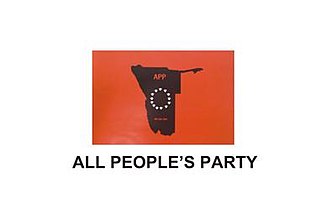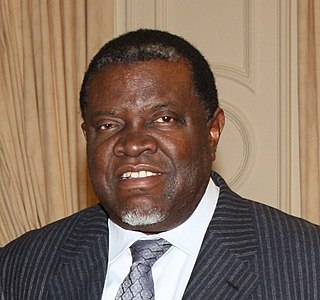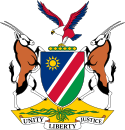
Namibia, officially the Republic of Namibia, is a country in Southern Africa. Its western border is the Atlantic Ocean; it shares land borders with Zambia and Angola to the north, Botswana to the east and South Africa to the south and east. Although it does not border Zimbabwe, less than 200 metres of the Zambezi River separates the two countries. Namibia gained independence from South Africa on 21 March 1990, following the Namibian War of Independence. Its capital and largest city is Windhoek. Namibia is a member state of the United Nations (UN), the Southern African Development Community (SADC), the African Union (AU) and the Commonwealth of Nations.

Politics of Namibia takes place in a framework of a semi-presidential representative democratic republic, whereby the President of Namibia is both head of state and head of government, and of a pluriform multi-party system. Executive power is exercised by both the president and the government. Legislative power is vested in the two chambers of Parliament. The judiciary is independent of the executive and the legislature.
The history of Namibia has passed through several distinct stages from being colonised in the late nineteenth century to Namibia's independence on 21 March 1990.

The South West Africa People’s Organisation (SWAPO) officially known as SWAPO Party of Namibia, is a political party and former independence movement in Namibia. It has been the governing party in Namibia since the country achieved independence in 1990. The party continues to be dominated in number and influence by the Ovambo ethnic group.

The president of the Republic of Namibia is the head of state and the head of government of Namibia, as well as the commander-in-chief of the Namibia Defence Force, according to the Constitution of Namibia.

Hifikepunye Lucas Pohamba is a Namibian politician who served as the second President of Namibia from 21 March 2005 to 21 March 2015. He won the 2004 election overwhelmingly as the candidate of SWAPO, the ruling party, and was reelected in 2009. Pohamba was the president of SWAPO from 2007 until his retirement in 2015. He is a recipient of the Ibrahim Prize.

Elections in Namibia determine who holds public political offices in the country. Namibia is a semi-presidential representative democratic republic. It runs direct elections every five years for the position of the president and seats in the National Assembly, and every six years for the Regional Councils and the distribution of seats in local authorities. The National Council is elected indirectly by the constituency councillors of Namibia's 14 regions.

The prime minister of the Republic of Namibia is the leader of the Government of Namibia. The prime minister is appointed by the president of Namibia and co-ordinates the work of the Cabinet. They also advise and assist the president in the execution of the functions of government.

The Popular Democratic Movement (PDM), formerly the Democratic Turnhalle Alliance (DTA), is an amalgamation of political parties in Namibia, registered as one singular party for representation purposes. In coalition with the United Democratic Front, it formed the official opposition in Parliament until the parliamentary elections in 2009. The party currently holds 16 seats in the Namibian National Assembly and one seat in the Namibian National Council and is the official opposition. McHenry Venaani is president of the PDM.

The National Unity Democratic Organisation (NUDO) is a political party in Namibia. It has been represented in the National Assembly of Namibia and in the National Council of Namibia since it split from the Democratic Turnhalle Alliance prior to the 2004 general and local elections. The party's president is Esther Muinjangue.

Hage Gottfried Geingob is the third and current president of Namibia, in office since 21 March 2015. Geingob was the first Prime Minister of Namibia from 21 March 1990 to 28 August 2002, and served as Prime Minister again from 4 December 2012 to 21 March 2015. Between 2008 and 2012 Geingob served as Minister of Trade and Industry. He is also the current president of the ruling SWAPO Party since his election to the position in November 2017.

The South West Africa National Union (SWANU) is a Namibian political party founded in 1959. Most of its members came from the Herero people, while fellow independence movement SWAPO was mostly an Ovambo party. The party's president is Tangeni Iiyambo.

General elections were held in Namibia on 27–28 November 2009. They were the fourth general elections since independence and the fifth democratic elections. Voting ended on 28 November and official election results, released on 4 December, showed that Hifikepunye Pohamba and his SWAPO Party were re-elected, each with over 75% of the vote. Prior to the election, the South West Africa People's Organization (SWAPO) was widely expected to score a landslide victory, with the Rally for Democracy and Progress (RDP) considered SWAPO's biggest challenger. Fourteen political parties competed for seats in the National Assembly of Namibia, and twelve candidates ran for the Presidency.

The All People's Party (APP) is a political party in Namibia.
The National Patriotic Front is a political party in Namibia.

General elections were held in Namibia on 28 November 2014, although early voting took place in foreign polling stations and for seagoing personnel on 14 November. The elections were the first on the African continent to use electronic voting.
The Electoral Commission of Namibia (ECN) is an agency of the Government of Namibia. It was founded in 1992 under the Electoral Act #24 of 1992. The aim of the commission is to oversee all Namibian electoral activities starting from voter registration and political party registration, to the setting and monitoring of elections, counting of ballots and making results available.

Namibia held elections for their local and regional councils on 27 November 2015. Ballots were cast using electronic voting.
The Landless People's Movement (LPM) is a political party in Namibia. It was founded in 2016 and registered in 2018. It is led by former deputy minister of lands and resettlement Bernadus Swartbooi, who serves as its president and chief change campaigner, and Henny Seibeb, the party's deputy leader. The party has four seats in parliament.











